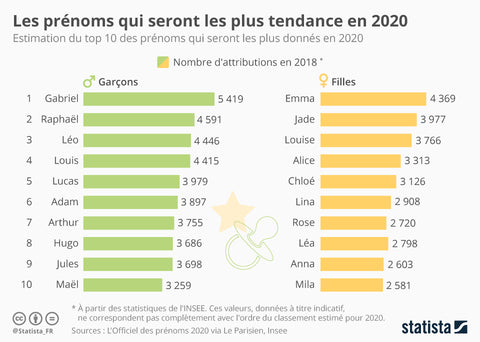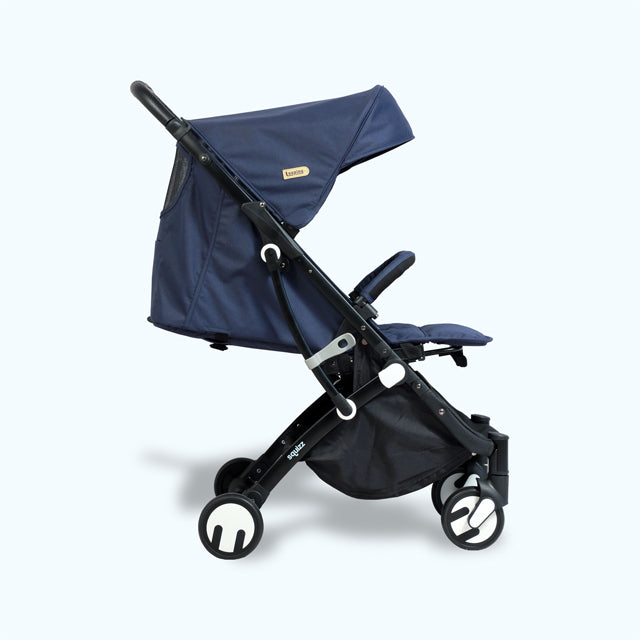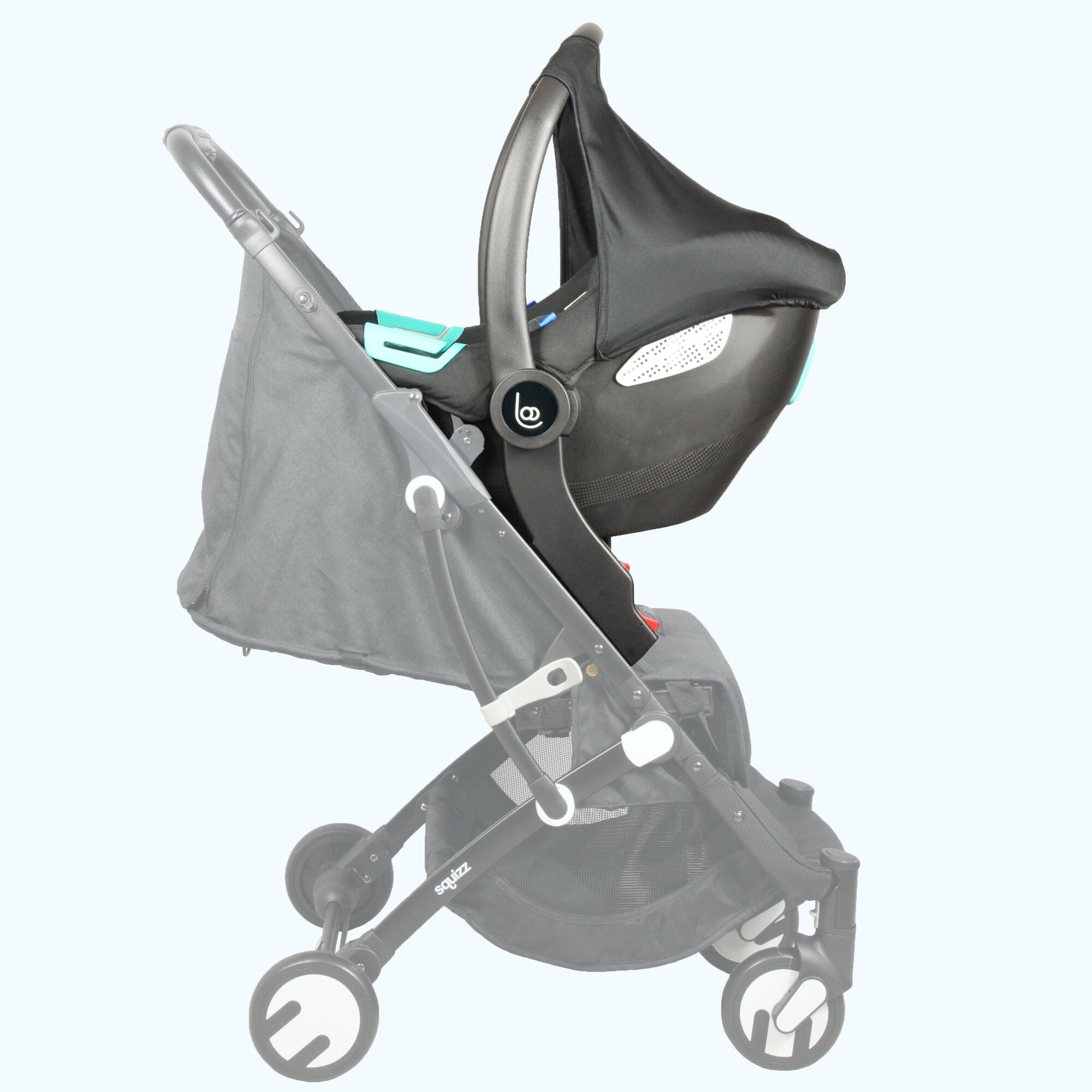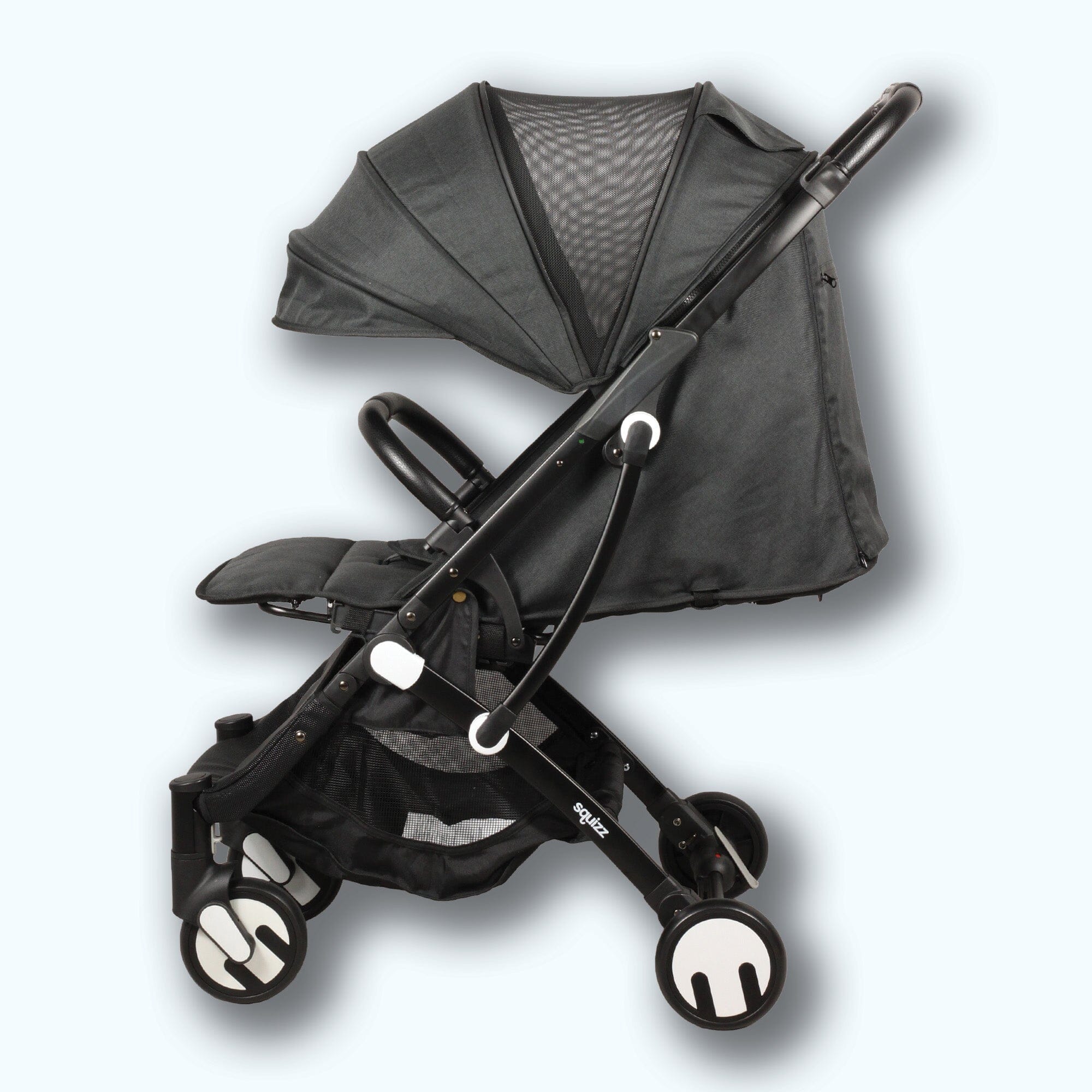We are in a time of peace and prosperity where parenthood has a desire for omnipotence over the destiny of children. Modern, old, common, original... Does this choice really have an impact on everyone's life and character? A wealth of research shows how much your name can affect your success in life. According to this research, this would be the founding act of our existence and a social label that we carry around throughout our lives. It could have an influence on our personal and professional, even intimate life.
Indeed, Anne-Laure Sellier, specialist in social psychology at HEC Paris and author of the book “ Le Pouvoir des Prénoms ”, indicates that 76% of French people are convinced that a first name can influence the course of a life.
1. The consequences of first names according to studies
According to an American study by economists Saku Aura and Gregory D. Hess, certain characteristics of first names have an influence on success in life. For example, the number of syllables, the conventional spelling or not, if the first name is frequently listed nationally, if it is a nickname (Alex, Lou)... Their analyzes (on 6000 people) reveal that the characteristics of the first name can predict the social status, the level of education and the salary of the person.
“ It makes sense, when you think about it, explains Anne Laure Sellier. We call you by your first name 20 times a day since you were little, we put particular intonations into it... This conditions your reactions and the way you behave and, over time, it ends up forging your personality and thus shaping your life. Today, we have scientific data, we have tools, in particular with artificial intelligence, which measures what we can learn about the true significance of the first name . »
Name stereotypes can manifest in facial appearance
According to Anne Laure Sellier, our face could even bear the traces of our first name. It indicates that the manifestation of our first name on our face is the culmination of years of unconscious work.

She writes that “ if the stereotype of a Julie matches that of a smiling, bright girl, people will come to Julie expecting that face. Julie, by unconscious imitation, begins to smile up to her interlocutor's expectations. Over many years of this repeated behavior, over thousands of interactions with others who - within our cultural group - share this stereotype of Julie, our Julie eventually bears the permanent mark of a bright, smiling face. . In order to be recognized and accepted by others, we put ourselves in the fold of the representation that others have of our first name. It's like couples who end up looking alike ”.
Research shows that facial appearance affects social perceptions. Current research investigates the opposite possibility: can social perceptions influence facial appearance? The hypothesis is that name stereotypes can manifest in facial appearance. In 8 studies, this effect is shown to exist, as participants examining an unfamiliar face accurately choose the person's real name from a list of multiple names, which is significantly above the level of chance. .
“Booba, Lola, Benoît are associated with more rounded silhouettes than Eric, Loïc or Alix perceived as more angular, explains Professor Nicolas Guéguen. French female first names are moreover two to three times more likely to be associated to a round silhouette than male first names (…) The sound of a first name alone is enough to evoke in us a shape, which we associate with the person who wears it (…) We look like our first name but we are not not physically 100% our first name. Individuality can then express itself ".
A common first name that is easy to pronounce would be more favorable.
"Anthony" more reassuring than "Devon"?
In a New York University study, researchers found that people with easier-to-pronounce names often hold higher-level positions. Adam Alter, a psychologist, explains that when we can process information more easily, it's easier to understand, we like it more.

If common first names offer children more chances of integrating into society than original first names , this is not their only particularity. Contrary to what one might think, they also allow children to individualize themselves. " The common first names do not mark the project that the parents have for their child, and therefore leave the latter the possibility of becoming himself more quickly ", specifies the psychoanalyst François Bonifaix, specialist in first names and author of " Traumatism of the first name ".
Original first names, on the other hand, mark children with a hot iron and make the process of individualization slower, even more difficult.
In 1948, researchers Houston and Sumner announced that having an unusual first name could, to a certain extent, impact the self-esteem of the child as well as his school results. “It could be that conventional first names, which reinforce self-esteem and which are better appreciated by teachers, facilitate school and university performance ,” notes Dr. Guéguen.
Anne Laure explains that there is an increasing desire among parents to hyper-individualise the child, to make it unique by giving it an original first name, for example. She explains that even the simple act of changing the spelling of a first name could be problematic. "We say to ourselves: 'I'm still not going to call him Louis! "So, we are tempted to change the spelling of the first name. However, one of the things that causes the most harm is when you give a classic first name and you change the spelling. It's the worst thing to do. do, because all your life, he will have to spell his first name, she warns. It will be Louys with "y", except that this little extra thing that we think is extraordinary, it will become a little less thing for the person. " A child would therefore need simplicity and above all to be accepted.
The first names can sometimes reflect the social origin of the child: in the collective imagination, certain compound first names thus refer to the bourgeoisie, while others, like "Kevin", refer to a more popular social environment. "The first name can therefore be the source of ridicule and non-insertion if one evolves in a different environment from that to which one has been labeled" , explains the psychoanalyst.

In a study from Marquette University, researchers found evidence that names considered less unique were more likeable. People with common names would be more likely to be hired, unlike those with rare names. In 2011, psychologists Simon Lahal, Peter Koval, and Adam Alter found, among other things, that the more American lawyers have an easy-to-pronounce first and last name, the more senior positions they hold within their firm. Thus, the more the first name is fluid, the easier it would be to climb in the professional hierarchy . According to the author, it would act until the choice of our profession, our place of life, our friends, our spouse and on the image that we have of ourselves. In short, it would rub off on our happiness.
It is not uncommon to give children the first name of a deceased grandparent, as a tribute. The weight of this choice is sometimes heavy to bear, because the child becomes the extension of someone who is no longer.
"The missing person lives through the child, which can give him the impression that his existence is denied" , specifies François Bonifaix.
Implicit egotism
According to Anne Laure Sellier, “ we prefer the people, places and things that we unconsciously associate with ourselves. This phenomenon is called "implicit egotism". This means that we have a particular affection for what looks like us (egotism), but we ignore it ". In the United States, " there is a disproportion of Denis and Denise among dentists, of Lawrence, Laurie or Lauren among lawyers (in English, lawyer is called lawyer) ". In the same way, in the United States there is a disproportionate number of Louis in Saint-Louis, of Bernard in Saint-Bernard, etc.
Still in this idea of implicit egotism, we would also be more attracted to people with a first name resembling ours.
Rare names are associated with juvenile delinquency.
A 2009 study at the University of Shippensburg suggested that there is a strong relationship between first name popularity and youthful criminal behavior. Researchers found that young people with unpopular names were more likely to engage in criminal activity. The results obviously don't show that the unusual names caused the behavior, just a connection. And the researchers have theories about their findings: "Teenagers with unpopular names may be more prone to crime because they are treated differently by their peers, which makes it harder for them to form relationships (. ..) they can also act because they don't like their names.”
Baptiste Coulmont studied this sociology of first names through baccalaureate mentions: in 2015, out of 982 candidates named "Dylan", only 2.6% obtained a "very good" mention against 21.9% of "Joséphine". And among those who had scores between 18 and 20, there were mainly "Éloïse", "Constance" or "Théophile". Those who had bad grades were rather called "Kylian", "Christopher" or "Allison". It is obviously not the first name that makes you succeed or fail, but it reveals the social origin of the candidates and this sociology explains success in the baccalaureate.
But then, is it better to have a “rare” first name or a fashionable first name?
According to Nicolas Guéguen, behavioral science researcher at the University of South Brittany and author of "Psychology of First Names" , research is somewhat contradictory on the "rare" first name. It can have an advantage if it is not too difficult to pronounce and if the sounds are pleasant or melodious. To be well perceived, it must also correspond to the social background of the wearer. The fashionable first name is often satisfying because it is normative and most people like to be in the norm.
2. Fashion for first names
The history of first names
We all have first and last names. These define us. They allow us to be recognized by everyone and by society. But where does this tradition come from? Why are there first names ?
To understand this, we have to go very far back. We are in Roman times. At that time, everyone had a name, a first name and a nickname. It is the latter which was then the most important. We chose it according to the person, his personality or his way of being. This denomination was used to designate the person. Gradually, and thanks to the power of this empire, this tradition began to develop in other territories, such as Gaul. This way of doing things continued for centuries. We used to call everyone by their nickname, even if everyone had a first and last name. It was not until 1539 that everything changed. That year, King Francis I decreed that birth registers were now compulsory. The members of the clergy, who took care of these documents, therefore began to choose the names of saints as first names. Then they put the father's surname on it. This is how the use of the surname disappeared, in favor of that of the first name.
Until the end of the Middle Ages, the personal name or baptismal name was the main name of any identity. It is generally accompanied by different determining names, in order to distinguish the different people bearing the same first name: name of geographical origin, residence (from oak , Angevin, etc.), filiation (surname: Martin, Jean , etc.), parenthood, profession (the merchant , butcher )…, or nickname - often a singularity linked to the physical or the character (nicknames like the big one, the good one, joly or even Martineau , the little Martin).
Over time, the family name acquires a prominent place in the identity. The main name is then only a "pre-name", it is no longer the one that serves as an entry in the dictionaries although it precedes the family name in time (it is the name of childhood).
The law of first names

Since the law of January 8, 1993, parents enjoy greater freedom to baptize their child. However, everything is not allowed in terms of first names, far from it. And this, in the interest of the child. Law n°93/22 of January 8, 1993 relaxes the regulations concerning first names. It offers parents the possibility of choosing original baptismal names. Indeed, they are authorized to give any first name to their child, insofar as it does not prejudice either the rights of third parties or the child. If a first name seems contrary to the interests of the child, the civil registrar notifies the public prosecutor and a family affairs judge decides whether to maintain it or remove it. Regularly, first names deemed contrary to the interests of the child are thus refused (Titeuf, Manhattan, Nutella, etc.)
An administrative circular mentions that “only the Roman alphabet can be used and that the only diacritical signs allowed are dots, umlauts, accents and cedillas as they are subscribed or superscripted to the vowels and consonants authorized by the French language. »
In Rennes, parents who wanted to call their son Derc'hen were refused registration of the first name, because of the presence of an apostrophe. The same goes for little Fañch, born in May 2017 in Quimper, whose first name had been refused because of the presence of the “tilde” on the n.
What did the French legislation allow before, in terms of first names?
Before 1993, French legislation was very strict on the issue. The law of 11 germinal year XI (April 1, 1803) required parents to choose a first name from various calendars or from among the characters of ancient history. In the 20th century, a first softening took place. The ministerial instruction of April 12, 1966 authorized regional first names, compounds, from diminutives or taken from mythology. In any case, civil registrars then had all the power to accept or refuse a first name. Their opinions sometimes diverged depending on the place…
Each generation and social class has its first name!
As specialist Anne-Laure Sellier explains, there is strong pressure on parents at the time of choice. Parents are torn between several strategies. The " refuge strategy " consists of giving a simple, frequent and easy-to-pronounce first name, such as Louis, Emma and Gabriel, so that the child's life is as simple and easy as possible. Conversely, the " strategy of difference " consists in finding a first name among those least given, in order to make your child a "unique" being. Either way, it's best to think twice: one in five mothers says she regrets the name she chose for her child, reports the Guardian.
This last trend has increased since 1993 (when the choice of first names was liberalized) with an anthology of small names fully in line with our time: they can be original like Océane, Prune or Myrtille, foreign like Mattéo, Kim , Ryan… or created from scratch (with a different spelling (Kloé) or a derivative of first name (Eléonie, Liséa) for example).
As Nicolas Guéguen stipulates, the choice of first name is part of a societal context (a specific time and place). Nowadays the most given first names are characterized by their dynamism (short) and their sound (exotic, soft, etc.). The Léo, Zoé, Tom, Lola… thus appear at the top of the ranking of the favorite first names of the French. The more classic first names, reminiscent of an era considered a "golden age", have also had their heyday in recent years. It is thus becoming more and more easy to inherit a slightly obsolete first name like Édouard.
trendy first names

Gabriel, Raphaël, Léo, Louis and Lucas for the boys; Emma, Jade, Louise, Alice and Chloé for the girls. The leading quintet is made up of first names that have been in vogue for a few years now. These first names firmly anchored at the top of the ranking will again be the most fashionable in 2020, according to L'Officiel des prenomen. On closer inspection, the top 20 trends for next year strongly resemble the ranking established by INSEE based on 2018 civil status data...
The trend is always for short first names with one or two syllables (Léo, Jules, Hugo…). On average, they are composed of five letters. Retro first names are also fashionable (Louis, Gabin) and come from the Old Testament. Noah and Tom are in retreat. Nolan, 19th last year and 15th in 2018, fell off the charts and Mohamed returned to 19th position.
Among the girls, we note the arrival or return of Julia (disappeared from the top last year), Iris, Jeanne, Lou and Agathe, and the disappearance of Manon (14th last year), Zoé, Camille, Lola and Elena. There is also a craze for first names with a universal dimension, which work in different countries or different religions. Gabriel, Adam, Sacha, Noah, Jade, Anna, Lina, Mila… All these first names adapt to all situations.
Our favorites
Finally, here is a small list of our favorite names. With a little luck, this one can help you in your choice!
| Boys | Girls |
|
MAEL |
LUCY
LISE
LILY |
I n the idea that the choice of first name can guide the future of a child in one direction, it is therefore necessary to make a judicious choice. And don't forget that depending on the final choice, the child will have, or not, an additional work of appropriation to do. .. Girl or boy, be careful! If you have a small preference for one of the two sexes, do not hesitate to go to our article which explains the influence that food can have on the sex of your future baby.
To close this article, we enlighten you one last time on the main points to take into account…
- Be careful in the choice of the first name and do not limit yourself to its aesthetic aspect
- Do not make a decision on a whim, even if it means waiting for the birth of the child: you have three days at birth to declare the final first name
- Avoid giving him the last successful first name of this or that TV series: don't forget that it is your child who will wear it all his life
- Make sure that the first name articulates well with the last name, it counts.
- Your child is unique, so why not choose a name that he will be the only one in the family?
- Think about him when he's older: avoid first names that risk being changed by little friends. These are not lacking in imagination, which can harm your child.
And you , what do you think?
Finally, here is a short video that summarizes our article. Good viewing ! ♡
Sources:
https://www.pediatre-online.fr/new-born/prenom-influence-t-personalite-destin-de-lenfant/ https://www.lapresse.ca/vivre/societe/201809/21/01- 5197506-notre-prenom-influence-t-il-notre-vie.php https://www.femmeactuelle.fr/enfant/enfants/le-choix-du-prenom-peut-il-influencer-la-personnalite-dun -child-2069752 https://www.businessinsider.com/what-you-name-your-kids-will-affect-their-success-2016-9?IR=T#if-you-have-a-white- sounding-name-youre-more-likely-to-get-hired-4 https://www.doctissimo.fr/grossesse/choisir-un-prenom/prenom-de-votre-enfant-determine-t-il-son - character https://www.pourquois.com/societe/pourquoi-y-a-prenoms.html https://fr.wikipedia.org/wiki/Pr%C3%A9nom https://www.parents.fr/ first names/our-advice-first-names/choice-of-first-name-what-the-law-of-january-8-1993-has-changed-304999#:~:text=La%20loi%20n%C2%B093 ,third%20ni%20%C3%A0%20child . https://www.leparisien.fr/archives/dans-le-retro-choix-du-prenom-l-annee-ou-la-loi-a-change-13-10-2015-5182111.php https:/ /www.pourquois.com/societe/pourquoi-y-a-prenoms.html
https://www.ouest-france.fr/economie/demographie/les-prenoms-qui-seront-les-plus-donnes-en-2020-ceux-qui-ont-ete-le-plus-donnes-en- 2018-6504919














